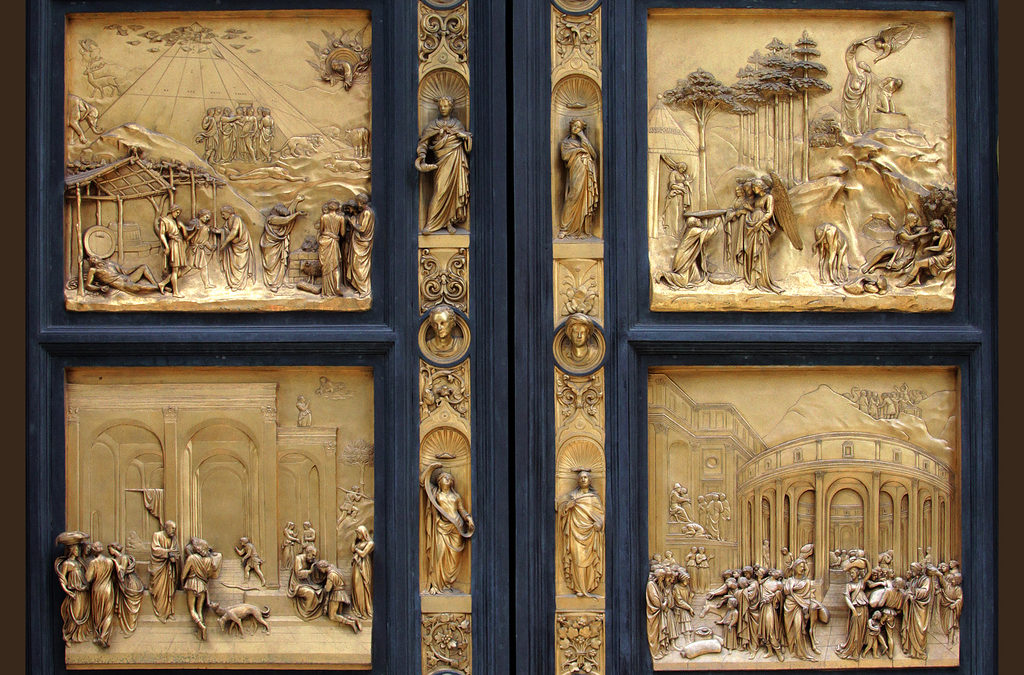
La Porta del Paradiso un capolavoro di Lorenzo Ghiberti
Lorenzo Ghiberti (UK: / ɡ ɪ ˈ b ɛər t i /, US: / ɡ iː ˈ-/, Italian: [loˈrɛntso ɡiˈbɛrti]; 1378 - 1 December 1455), born Lorenzo di Bartolo, was an Italian Renaissance sculptor from Florence, a key figure in the Early Renaissance, best known as the creator of two sets of bronze doors of the Florence Baptistery, the later one called by Michelangelo the Gates of Paradise.

Porta del Paradiso di Ghiberti Olaszország
About Press Copyright Contact us Creators Advertise Developers Terms Privacy Policy & Safety How YouTube works Test new features NFL Sunday Ticket Press Copyright.

Lorenzo Ghiberti doors to The Baptistry of San Giovanni 'Gates of
4. Sono forse le porte più famose della storia dell'arte: la Porta Nord e la Porta del Paradiso, che Lorenzo Ghiberti eseguì per il Battistero di Firenze, testimoniano il passaggio dal tardogotico al Rinascimento. Il 23 novembre del 1403, Lorenzo Ghiberti (Pelago, 1378 - Firenze, 1455) firmava il contratto per la realizzazione della Porta.

Ghiberti, porta del Paradiso. Firenze, Battistero
Ghiberti was renowned both for his monumental bronze sculptures and for his development of a new type of pictorial low relief, which culminated in the panels of the Gates of Paradise for the Baptistery, Florence.. (Porta del Paradiso) 1425-52 Bronze with gilding, 599 x 462 cm Baptistery, Florence: 820*1111 True Color 197 Kb: Panel No. 1.
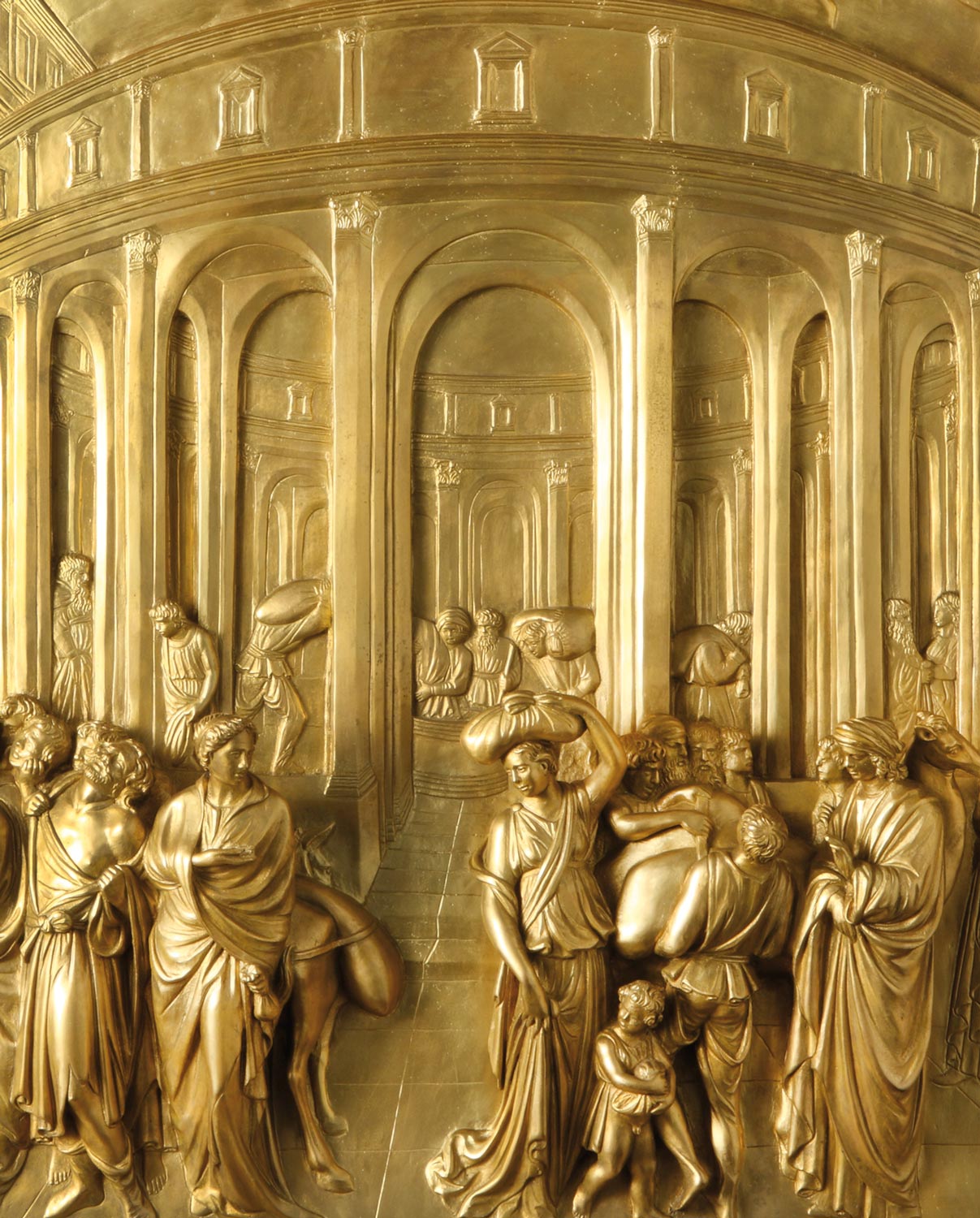
Pannello della Porta del Paradiso Galleria d'Arte Pietro Bazzanti
Il restauro della porta del Ghiberti, ed. Giusti,. Bemporad, Dora Liscia. " I punzoni per il fiorino sulla Porta del Paradiso: Michelozzo e Bernardo Cennini," Medioevo e rinascimento 20 (2006): 227-43.Google Scholar. Bernocchi, Mario. Le monete della Repubblica fiorentina, five vols. (Florence: L. S. Olschki, 1974 -85).Google Scholar.
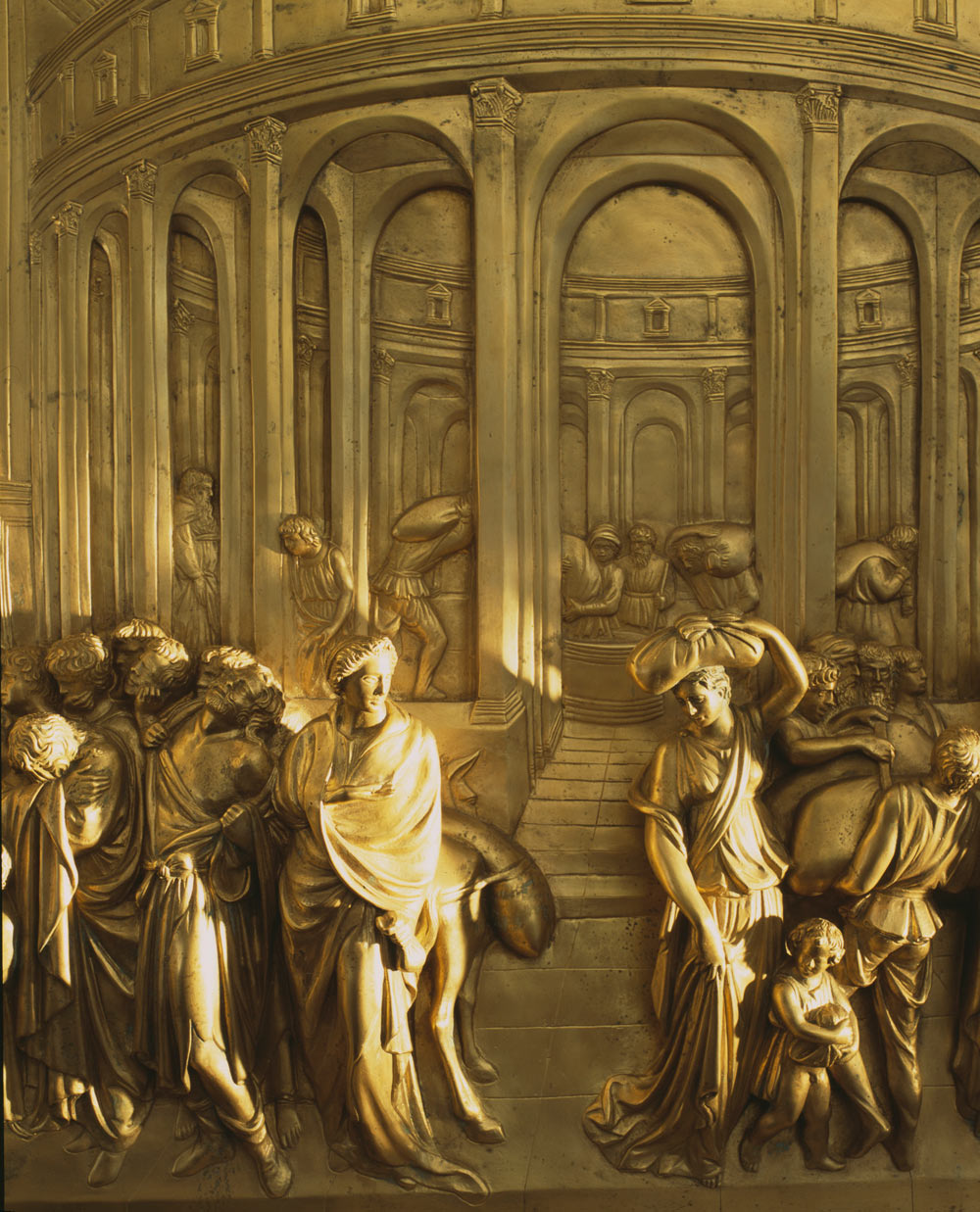
Pannello della Porta del Paradiso Galleria d'Arte Pietro Bazzanti
Ghiberti was renowned both for his monumental bronze sculptures and for his development of a new type of pictorial low relief, which culminated in the panels of the Gates of Paradise for the Baptistery, Florence.. (Porta del Paradiso) 1425-52 Bronze with gilding, 599 x 462 cm Baptistery, Florence: Panel No. 1: Creation of Adam and Eve 1425.

Lorenzo Ghiberti, Porta del Paradiso portadelparadiso Firenze
The exhibition The "Gates of Paradise": Lorenzo Ghiberti's Renaissance Masterpiece provides an unprecedented opportunity to see three of the bronze doors' famous narrative reliefs of Old Testament subjects, as well as four additional sections from the doorframes, before they are permanently installed in the Museo dell'Opera del Duomo, Florence. It also reveals important new findings made.

Porta del Paradiso, Lorenzo Ghiberti, 14251452, bronzo dorato
Description: Italian sculptor, architect, painter, writer and art historian: Date of birth/death: 1378 1 December 1455 Location of birth/death
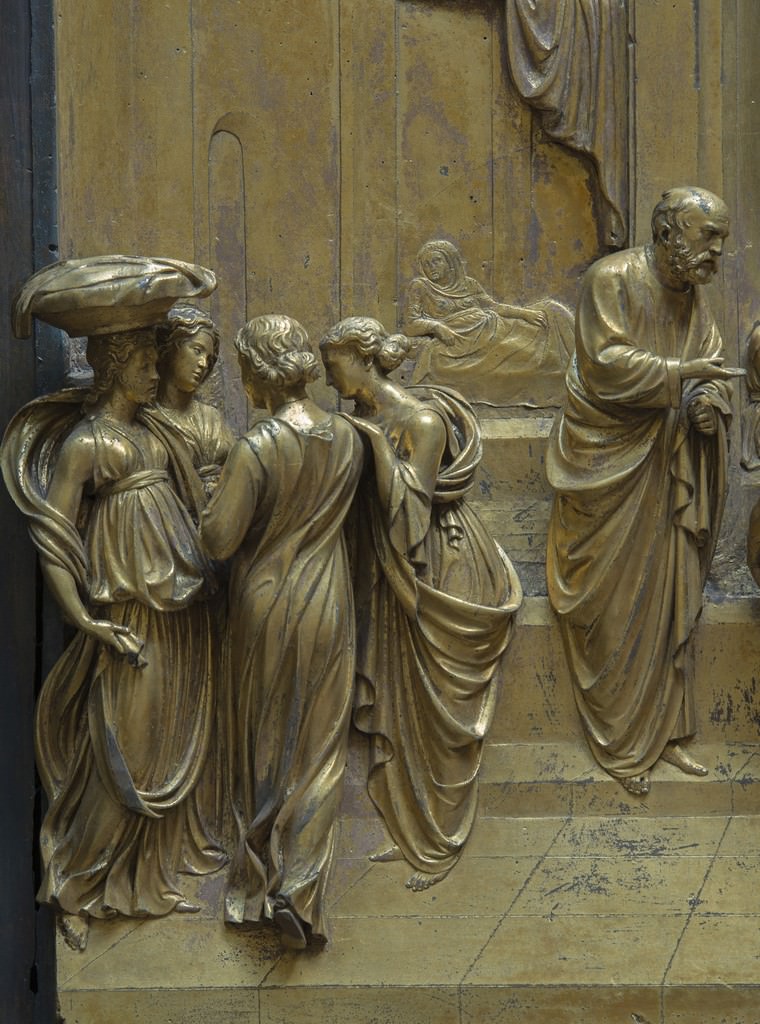
LA PORTA DEL PARADISO DEL GHIBERTI
Eastern Door of the Baptistery (Porta del Paradiso) 1425-52 Bronze with gilding, 599 x 462 cm Baptistery, Florence:. On 13 July 1452 the consuls of the Arte di Calimala decided that the new doors would replace Ghiberti's first set in the main portal of the Baptistery, and the earlier doors would be reinstalled on the northern side..
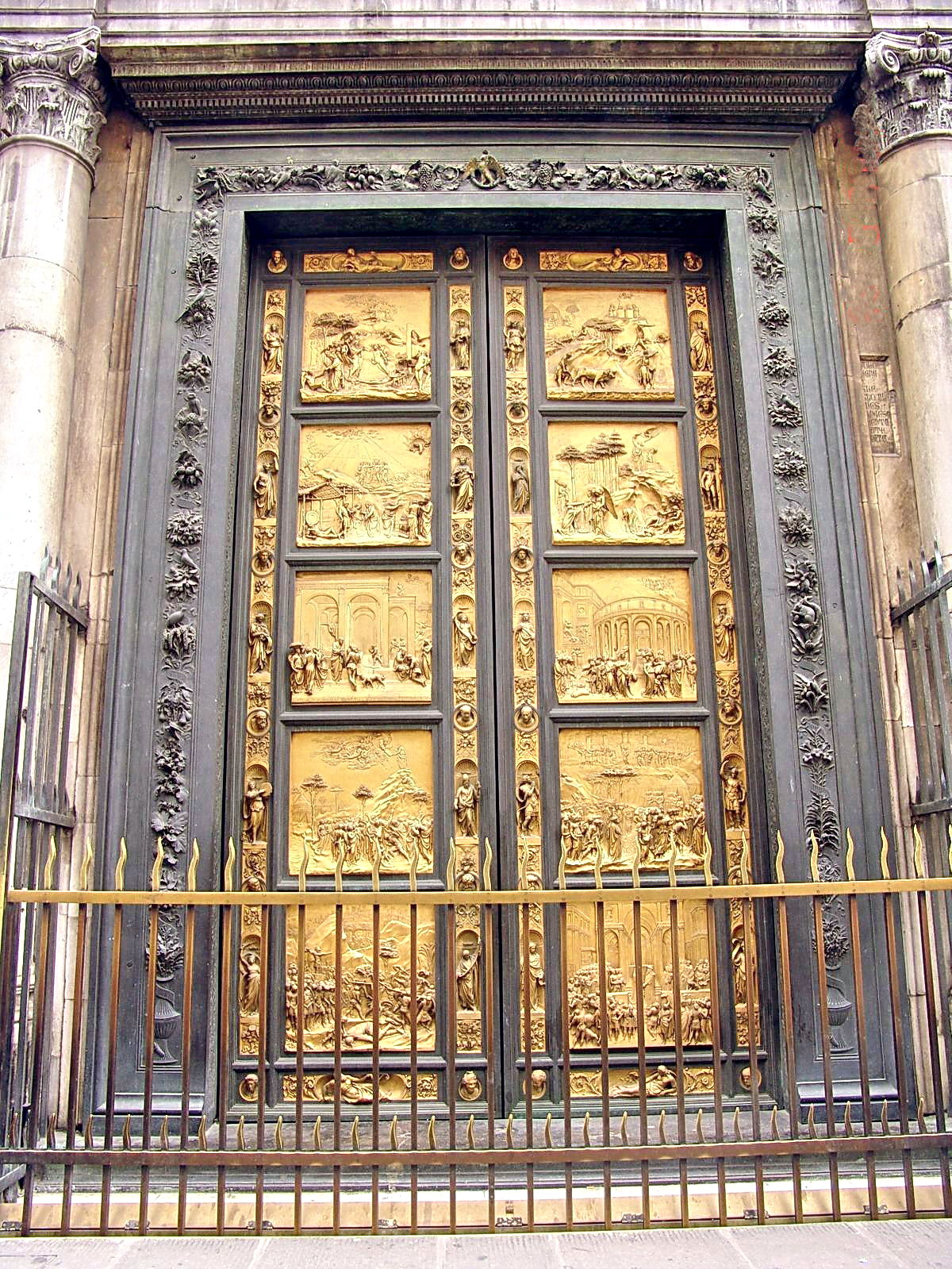
Ghiberti a las puertas del paraíso
The portraits of Lorenzo Ghiberti and his son Vittore can be recognized in the two central ones. In the middle listello we can read the self-celebratory inscription with the "signature" of the author: "[Opus] Laurentii Cionis de Ghibertis mira[bile] arte fabricatum" (
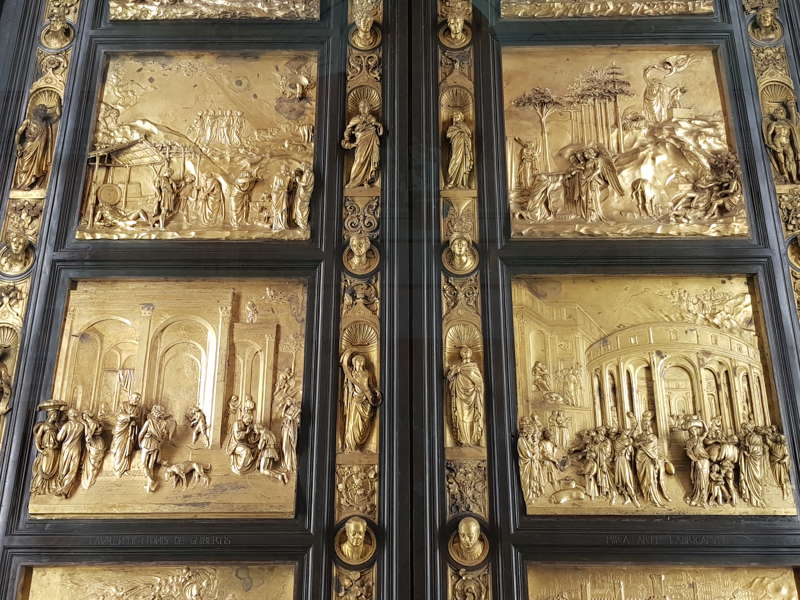
La Porta del Paradiso di Lorenzo Ghiberti, meraviglia del Rinascimento
The Gates of Paradise is the main gate of the Baptistry of Florence (Battistero di San Giovanni), located in front of the Cathedral of Santa Maria del Fiore.. The Porta del Paradiso, in Italian, was created by Florentine goldsmith and sculptor Lorenzo Ghiberti between 1425 and 1452 and installed in the eastern portal of the Baptistery. The Gates have been praised by generations of artists and.

Porta Est del Battistero di Firenze (del Paradiso) di L.Ghiberti 3D
La porta di bronzo dorato è la celebre "Porta del Paradiso" realizzata da Lorenzo Ghiberti tra il 1425 e il 1452 per l'ingresso orientale del Battistero. Le sue dieci formelle raffigurano storie dell'Antico Testamento.

Lotta al degrado. Via alla manutenzione della replica della Porta
Spero che tu abbia apprezzato questo post sulla Porta del Paradiso di Ghiberti e che la mia passione per l'arte abbia reso questa esperienza unica per te. L'opera di Lorenzo Ghiberti ci insegna quanto l'arte possa essere una fonte di ispirazione eterna, un ponte tra passato e presente.. Ti invito a vedere Firenze e le sue meraviglie, esplorando il Museo dell'Opera del Duomo lasciandoti.

Ghiberti's second commission resulted in the famous doors which are
Sala del Paradiso. Original location Baptistery of San Giovanni, exterior, north portal. Dimensions Height: 500 cm; Width: 290 cm; This door, created for the north entrance of the Baptistery, is a masterpiece by Lorenzo Ghiberti, realized between 1403 and 1424. Starting from the bottom, the panels depict the Doctors of the Church, the.

Lorenzo Ghiberti Porta del Paradiso, Battistero di Firenze 1425/52
Informazioni utili: la Porta del Paradiso di Ghiberti si ammira nel Museo dell'Opera del Duomo di Firenze, nella Sala del Paradiso. La sala del museo in cui è collocata, entro una teca di vetro per garantirne la conservazione, è un ambiente monumentale, il più scenografico, che ricrea in scala 1:1 la piazza esistente tra il Duomo e il Battistero: da un lato si osserva la ricostruzione.

Lorenzo Ghiberti, Porta del Paradiso, L'incontro tra Salomone e la
La Porta del Paradiso è la porta est del Battistero di Firenze, quella principale situata davanti al Duomo di Santa Maria del Fiore.Realizzata dall'orefice e scultore Lorenzo Ghiberti tra il 1425 e il 1452 (con un'importante collaborazione del figlio Vittore) rappresenta il suo capolavoro, nonché una delle opere più famose del Rinascimento fiorentino.